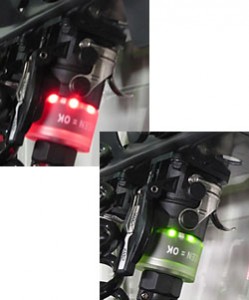This article is helpfull for braking information, taken from the ROSPA Safety Area.
1. The scale of the truck accident problem
Every year 14,500 – 16,000 large goods vehicles are involved in crashes in the UK
2. Safety Advice
The advice provided in the Highway Code recommends that drivers give large goods vehicles (LGV) more room in which to stop. The issue is how much room do they need?
3. Experimental Demonstration
The braking distance of a range of vehicle types was compared both at 30 and 45 mph. This illustrated that LGVs can need up to three times the distance in which to stop when compared to a car.
The general principle of heavier vehicles needing more room to stop was supported in subsequent test conducted at the Army’s driver training facility at Leconfield.
4. Braking theory & practice
Since the combined tyre footprint of a multi-axle LGV is proportionate to its weight the overall braking performance between vehicles should also be proportionate. But this is not so. If both the car and the laden articulated combination had both braked from 30mph, the lorry would still have been travelling at more than 20mph when the car had stopped. The question was why truck braking systems were so relatively ineffective.
5. Vehicle Design and Construction
a) Type approval
All vehicle types have to at least satisfy European Standards. They tend to be determined through compromise and trade-off between vested interests and result in an adequate rather than optimum standard.
b) Braking performance
Type approval sets minimum standards of retardation rather than required stopping distances. This enables manufacturers to design braking systems that meet a common standard of adequacy rather than a higher standard.
The braking systems on cars and motorcycles have improved in step with the other performance factors. The braking performance of LGV’s is subject to the following factors that can eat away at their effectiveness.
c) Hydraulic vs air brake systems
Cars use hydraulic braking systems but the pneumatic systems on LGV’s creates an unavoidable time delay between brake pedal application and the transfer of air pressure to the brake units.
d) Drum vs disc brake systems
The favoured drums on LGV’s, while suitable at lower speeds tend to fade and become less effective under sustained heavy braking.
e) Brake balancing
Truck braking force is also balanced between axle groups and between the tractor and trailer unit by a series of valves, the settings can be manually adjusted and may not create optimum performance .
f) Electronic braking systems
Electronic braking systems, currently being fitted to some Volvo and Mercedes Benz trucks, ensures optimum braking force in all situations and conditions.
g) Tyres
Different tyre compounds are chosen for different purposes. A soft compound tyre reduces skid risk but increases wear. The heat levels generated in compounds may increase pollution due to rubber deposits and carbon black and, because of increased drag, causes reduced fuel economy. A hard compound tyre will last longer, enhance fuel economy, but provide less grip and causes more damage to the road surface. The general-purpose tyre will optimise durability and adhesion. There is also a cost penalty and issues of environmental and operational effectiveness.
h) Driver behaviour
Lorry drivers are often blamed for travelling too close to other vehicles. Video footage of both motorway driving behaviour and crashes makes it clear that drivers may:
- not be aware of the facts
- not believe them
- be convinced it won’t ever happen to them
- simply not care
These issues remain a challenge for road safety experts to deal with.
Conclusion
There is a difference in braking efficiency between vehicle types. Technology has enabled braking efficiencies in excess of 100%. The stopping distance of poorly maintained trucks will undoubtedly be far greater than the values found during the experimental demonstrations. However, a higher level of retardation may not be welcomed by drivers hauling 25 tonnes of steel rods positioned one metre away from their back. They will always obey Newton’s Laws and will want to keep going at the pre braking speed. That in itself causes health and safety problems.
There is though an issue of
a) Public awareness raising for all drivers of motor vehicles
To ensure that adequate and appropriate information is made available to all. This may be through the media and better information in The Highway Code.
b) Research, development and fitment of station sensing and warning devices
The present state of development of vehicle telematic, proximity sensors and similar devices is such that vehicle, speed and situation-specific data could be used to inform and warn drivers of the fact that they were travelling too close to the vehicle ahead.
c) Targeted enforcement activity
In tailgating collisions the offending driver could be prosecuted for dangerous or careless driving. Why not adopt an accident prevention enforcement strategy and prosecute before the inevitable collision?
d) Improved vehicle brake system design and performance standards
Since there appears to be prima-facie evidence to support the case for improved truck braking efficiency, UK Government should press Europe for such improvement.
aide automotive market the BrakeCheck portbale brake tester, ideal for frequent testing on inspections. VOSA also recommend to test brakes every inspection.
